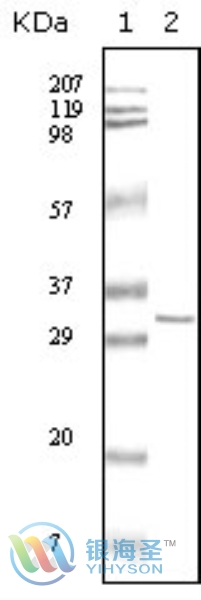AMM3251-61
[Monoclonal Antibody]
HPRT Mouse Monoclonal Antibody

www.yhsbio.com
market@yhsbio.com
support@yhsbio.com
+86-21-54651191
Room 703,Building 6,333# Guiping
Rd.,Xuhui District,Shanghai,China
market@yhsbio.com
support@yhsbio.com
+86-21-54651191
Room 703,Building 6,333# Guiping
Rd.,Xuhui District,Shanghai,China
DATASHEET
| Species: | Mouse |
| Applications: | WB ELISA |
| Immunogen Range: | A purified recombinant fragment of human HPRT expressed in E. Coli |
| Clonality: | Monoclonal Antibody |
| Isotype: | IgG1 |
| GENE ID: | 3251 |
| Swiss Prot: | P00492 |
| Synonyms: | The HPRT1 gene provides instructions for making an enzyme called hypoxanthine phosphoribosyltransferase 1. This enzyme allows cells to recycle purines, some of the building blocks of DNA and its chemical cousin RNA.The enzyme hypoxanthine-guanine phosphor |
| Purification: | Affinity chromatography |
| Storage: | Store at -20°C or -80°C in PBS with 0.02% sodium azide and 50% glycerol. Avoid freeze/thaw cycles. |
| Background: | The HPRT1 gene provides instructions for making an enzyme called hypoxanthine phosphoribosyltransferase 1. This enzyme allows cells to recycle purines, some of the building blocks of DNA and its chemical cousin RNA.The enzyme hypoxanthine-guanine phosphoribosyltrasferase (E.C.2.4.2.8., HPRT) plays a crucial role in uric acid synthesis and purine metabolism.This enzyme catalyzes the conversion of hypoxanthine and guanine to inosine monophosphate (IMP) and guanosine monophosphate (GMP), respectively, and uses phosphoribosylpyrophosphate (PRPP) as a cosubstrate and as a source of energy . This pathway is also known as the purine salvage pathway because it allows cells to reuse purine compounds to build DNA and RNA. |
| Caculated MW: | 25 kDa |
| Observed MW: | Refer to Figures |
| Applications: |
WB 1:500-1:2000 |
| Reacitivity: | Human |
For research use only. Not intended for diagnostic or therapeutic use!
Additional information
